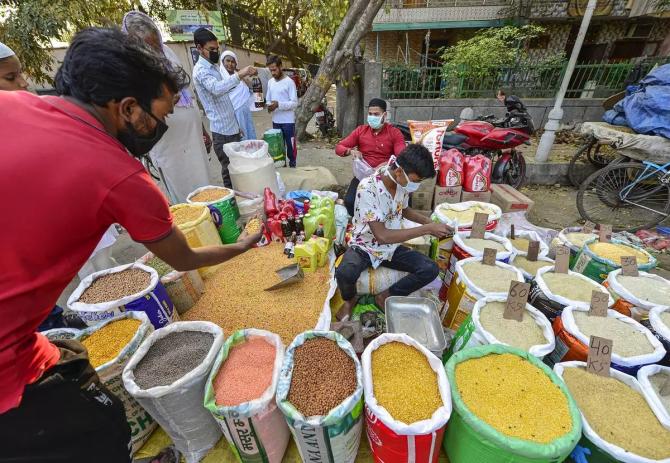India’s consumer price index (CPI)-based inflation could ease in the coming months thanks to the arrival of kharif crops, lower international commodity prices, and a pass through of lower input costs to consumers, the finance ministry said in its Monthly Economic Review (MER) for October, which was released on Thursday.

The MER, however, warned that the global macroeconomic situation remained precarious and a recession in many advanced economies would impact India’s exports.
“Easing international commodity prices and new Kharif arrival are set to dampen inflationary pressures in the coming months.
"Going forward, the current retail inflationary pressures are expected to ease with pass-through of lower input costs to consumers, also affirmed by the Reserve Bank of India’s inflation projections for the next two quarters,” the MER stated.
It pointed out that the wedge between CPI and wholesale inflation (which is influenced more by global prices) had declined from a peak of -10 per cent in November 2021 to -1.6 per cent in October 2022.
India’s headline retail inflation softened to a three-month low of 6.77 per cent in October from 7.41 per cent in September as food prices declined substantially.
This might make the Monetary Policy Committee (MPC) of the RBI less hawkish when it meets next month, even though it is unlikely that there would be a pause in the ongoing rate hike cycle.
The MER stated that the recovery in economic activity across sectors had improved the employment situation in the country.
It said the periodic labour force survey (PLFS) showed that the urban unemployment rate had declined for four consecutive quarters till June — the latest PLFS data released on Thursday showed a further dip in the urban unemployment rate.
It stated that net payroll additions in the Employees’ Provident Fund Organisation had grown in double digits in September, reflecting the increased pace of formalisation of the economy, while most private sector indicators showed that key industries had seen an increase in hiring activity in October and in the September quarter.
However, it added, larger macroeconomic risks remained.
“The global economy continues to navigate an increasingly turbulent and uncertain environment.
"Despite the current slowdown in global growth, inflation has risen to a multi-decade high in many economies, amid elevated food and energy prices.”
It said that alongside tighter financial conditions and a steep fall in consumer confidence, indicators of global economic activity had deteriorated.
The global composite PMI output index shrank for the second consecutive month in September, led by weakness in advanced economies as increasing uncertainty and high energy prices dented confidence.
“A rapid deterioration in global growth prospects, high inflation, and worsening financial conditions have increased fears of an impending global recession.
"The spillover of the global slowdown may dampen India’s exports businesses’ outlook,” the MER stated.
The report stated that India’s food supplies had also been impacted by the conflict in Europe and the vagaries of nature.
The domestic prices of some food items had risen amid a rise in international prices and grain availability was impacted by heat waves and deficient southwest monsoon in the current year.
However, export restrictions had ensured that the country’s needs were fully met.











 © 2025
© 2025